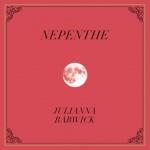
Julianna Barwick Nepenthe
(Dead Oceans)
Julianna Barwick is one of seldom few composers who can make apparently simplistic, minimalist ambient music, and find the impression of her individuality always floating in her wake. As on her 2011 album The Magic Place, Barwick’s music is formed around the constellations of her reverb-glossed vocal loops, wordless sequences of vowel sounds that fall into place with effortless harmonic cohesion. Nepenthe takes her sound its next logical step forward by filling out her music with a wider range of acoustic instruments that underpin the sonority of her vocals, with the help of sometime Sigur Rós affiliate Alex Somers (who produced Sigur Rós’ Valtari, and is half of Riceboy Sleeps/Jónsi & Alex).
The word “ethereal” is seldom absent from any paragraph about Barwick’s music, which makes the Sigur Rós connection ideal. Indeed, it verges on cliché that the album was recorded in Reykjavík: one can only avoid thinking about fjords and glaciers and northern lights for so long, because Nepenthe is so evocatively attuned to the cinematic Icelandic landscape. Listeners who were unaware of the collaboration will still hear a lot of Sigur Rós in Nepenthe. If it’s not a bowed guitar I’m hearing on Waving to You, the music achieves the same effect as Jónsi’s trademark; less instrumentation than an aura, performance that barely seems present. There are other moments too – a fuzzy snippet of an anxious whimper on Pyrrhic, a production trick seemingly lifted straight from Sigur Rós’ oeuvre. But beyond these relatively superficial similarities, Somers helps bring out more levels in Barwick’s music, fills out its outer dimensions with a grandiosity that never seems showy, because it’s always so characteristically Julianna Barwick.
Nepenthe peaks during its fourth and fifth tracks, Look Into Your Own Mind and Pyrrhic, the tracks which push the furthest in terms of sonic range. The former begins innocently, but Barwick’s vocal loops slowly become submerged by bass frequencies, and it feels like we begin to see beyond the tip of the iceberg. This mood continues into Pyrrhic, with the help of string quartet Amiina, who mesh seamlessly with Barwick’s vocals – until the subtle scrape of cello strings causes a pang of uneasy tangibility. The word “nepenthe” refers to an ancient Greek poetic term for a drug against melancholy. Barwick recorded the record while coping with a recent bereavement, and it’s tempting to see the music itself as having the effect of nepenthe, to hear that minor-chord cello string jutting out from the ether as the elixir momentarily wearing off.
These more subversive moments are never quite recapitulated in the record’s second half, which is perhaps something of a missed opportunity; Barwick could perhaps have deviated more from the steps she took on The Magic Place. Still, it’s full of inventive moments: a teenage girl choir on Forever, col legno strings on Adventurer of the Family, and múm-esque synth dewdrops on Crystal Lake are pleasingly unforced explorations of new layers in her music
One Half is the obvious lead track, notable for the first recorded semblance of lyrics in Barwick’s music: “I guess I was / Asleep that night / Was waiting for”. The ten words speak a lot about the headspace Barwick’s music inhabits – somnambulant, indeterminate, unresolved; above all telling no story but letting the listener fill in the blanks. Often it is as if her music wafts in to your listening space as if from afar; or, to repeat a cliché in earnest, as if you’re hearing it from within a dream. One Half is exceptional because every other track on Nepenthe features vocals which constantly sound mid-syllable, all half-formed thoughts and melodies. Like Grouper before her, she’s wonderful at exploring those liminal spaces, washing over and subtly overwhelming you.
15 August, 2013 - 04:29 — Stephen Wragg